
26 Mar 2015 by Jason Law CM –
What sets Christianity apart from most of the world’s belief systems is not just that is based on a faith aspect, but a relational one – and not a pedantic one – as a result of that faith. What makes it really special, however, is that as Christians, we know an awesome God that is full of majesty and power yet full of grace and forgiveness. On the 15th of March 2015, brother Hee Jin Chong shared a message in City Harvest KL about what it means to truly know God’s grace in an authentic manner.
Knowing God’s Grace
Today, there are many definitions in the dictionary about grace, not all of them related, yet all of them containing an essence of the concept. Grace, according to some of these definitions, carries a connotation of beauty or elegance in form or manner; a pleasing or attractive quality or endowment; favor or goodwill especially by a superior; or mercy, clemency, and pardon. While all these describe grace to an extent, it differs whether one knows what a concept is and actually experiencing it.
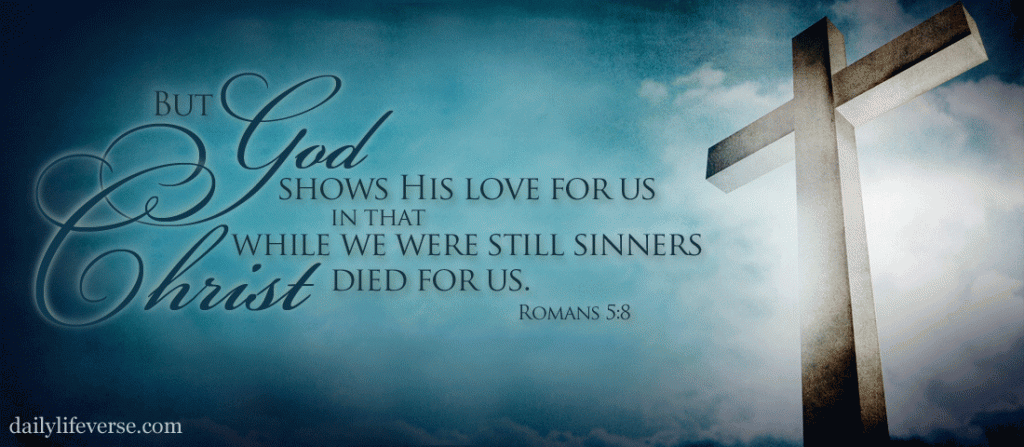
A huge part Christianity is about the grace of God, and so it matters to have a Christian understanding of what it is all about. Brother Hee shared that delving deep down into the Christian model of grace, we come to the remarkable reality of redemption. To the Christian, God’s grace is God reaching down to sinners, not just in favour, blessing or kindness, but also redeeming us into the saving knowledge and relationship with Him as our Father.
What Grace Is for the Christian
It is an extraordinary thing that an Almighty Being such as God would want to trouble or care about us. What makes it even more so is that this was in fact the very purpose God created men; that He wants to have a loving relationship with us, based on a family orientation.
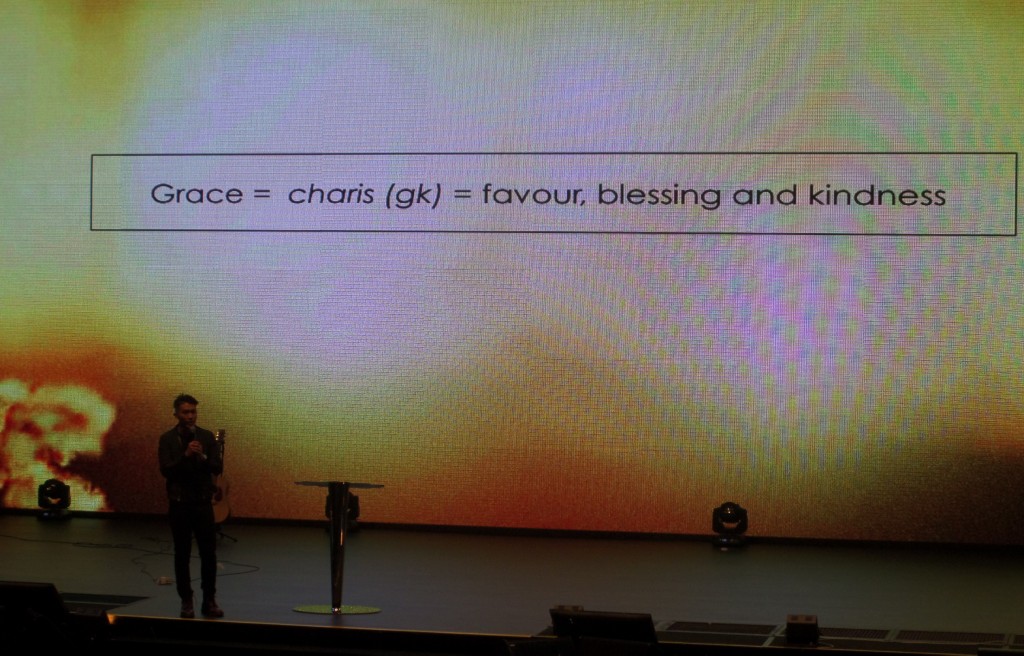
1 John 4:19 reminds us that we love God because He first loved us. Even in Genesis, from the moment Adam sinned, God was already putting into motion His plan for our redemption. In Genesis 3:21, the word of God tells us of God’s compassion; that He made garments of skin for Adam and his wife and clothed them. What’s more, God’s grace is consistent. God made a new covenant with men through Abraham and even before the birth of Christ, during Isaiah’s time, the coming of the Messiah was already foretold. A few thousand years after Adam, this compassion would become apparent in a much more significant form.
Brother Hee shared that one of the clearest example of God’s grace is found in the life of Aaron. In Exodus, after Aaron had made the molded calf and misled the people to worship it, he even made excuses. Nevertheless, after Aaron repented, God responded with grace. “Not only did God not strike Aaron dead, He even made Aaron His high priest that’s allowed to enter the Holy of Holies. God still loved Aaron enough to use him as a high priest.”
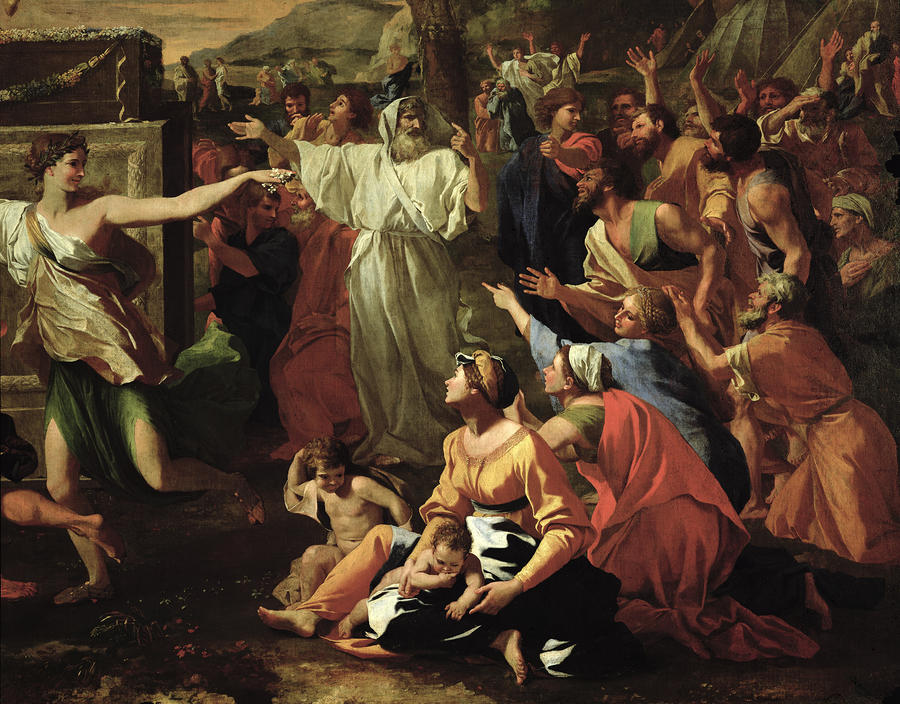
This part of Aaron’s life gives us a cautionary story. Sometimes during times of challenges and while waiting for God, we start putting our trust in the things of the world. We start to forsake God and betray Him. Brother Hee expressed that it is never easy to forgive a betrayer. “We betray God all the time but God is steadfast in His love. Imagine if we’re betrayed, would we be able to give grace? It is not easy. Yet such was the grace of God. Never write yourself out because God will never write you out,” brother Hee encouraged.
Grace and Forgiveness
What this means is that, deeply tied with God’s grace and redemption, is the issue of forgiveness. Some people may question if God is so powerful, why doesn’t He just wipe out sin with a snap of His fingers. In as much as God could just erase sin in such a way, He cannot betray Himself. He is a holy God and there is an importance in holiness. Sin is not erasable; it has to be accounted for, and it is something that is impossible for us to pay for. It was the reason for Calvary and this is the role of grace, so that we can be reconciled with God.
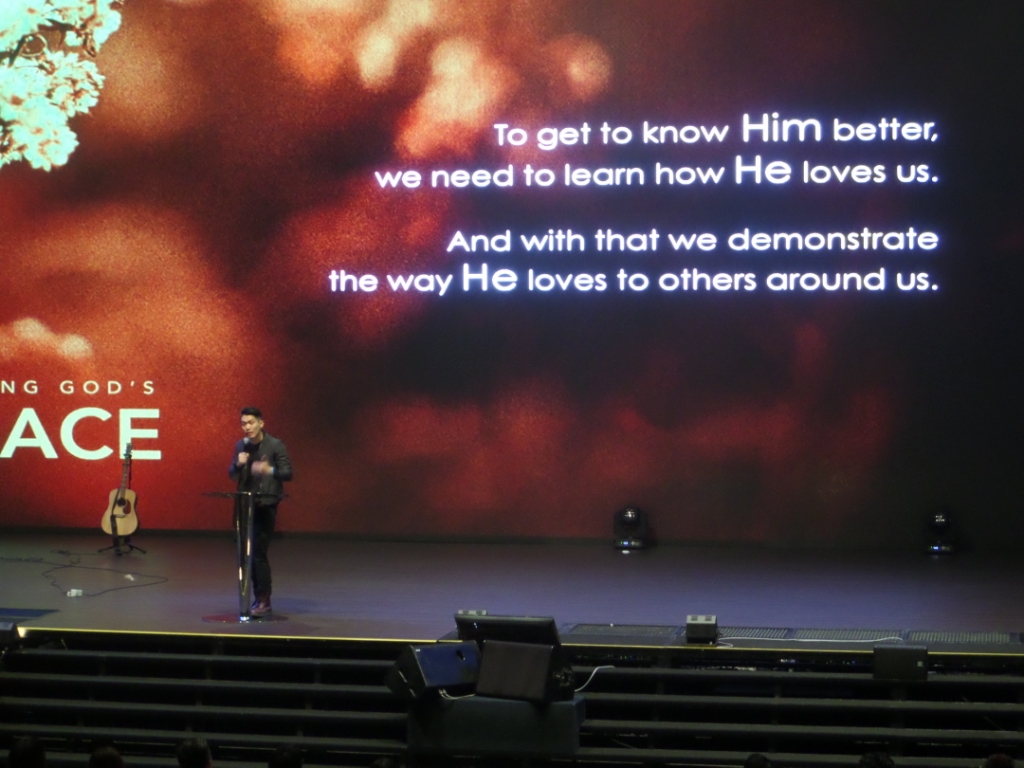
As followers of Christ and as God’s children, we are called to practice that same grace and forgiveness to the people around us who have hurt us. However, we also know that forgiving those who have hurt or betrayed us is never easy. How can we love and extend grace and forgiveness to those who have betrayed us? It is by coming to know God more and by developing the fruits of the Spirit into our lives.
Brother Hee conveyed that because God has extended His hands of forgiveness and redemption unto us and given us a new identity, we can in fact forgive our enemies. Grace is meaningless if we only love those who are good to us. In Matthew 22:34-40, Jesus emphasized love as a commandment for Christians and He placed an equal emphasis on loving people. By dying to ourselves, we can start to renew ourselves and live again.
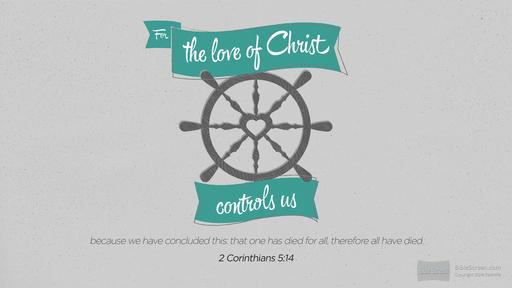
John, the disciple who was closest to Jesus, recognized the role of love and forgiveness in the lives of Christians. In 1 John 4:7-21, he wrote about God’s love and ours. God is love and because He values His people, therefore we ought to love the people around us. Too much of the spirit of resentment can bring division and fracture churches. It can break families and tear nations apart. In the worst situations, it can even lead to those involved forsaking the faith. Brother Hee imparted that while forgiveness is not easy, it is important, even crucial.
The Ministry of Reconciliation
Forgiveness begins with us and Christians are called to the ministry of reconciliation. We are, in fact, not just called to forgive, but also to be peacemakers. Brother Hee encouraged; ‘Make it a point to reconcile with others and clear off any bitterness, secret or otherwise, despite the effort, distance, or self-sacrifice that may be needed.’

In order to love, we must first learn to forgive. We are sinners ourselves, and no one is totally free from hurting others. That is why we need to go beyond our offences. We cannot earn our forgiveness, but it has been given to us freely by God, and ability and willingness to forgive others in turn is evidence of God working in us. ‘Being able to forgive releases us from burdens and chains that are shackling us,’ he shared. The service ended with prayers of release over the congregation and a communal reconciliation between leaders and members of the church.
|Share The Good News|
1 John 4:7-21
God’s Love and Ours
7Dear friends, let us love one another, for love comes from God. Everyone who loves has been born of God and knows God. 8Whoever does not love does not know God, because God is love. 9This is how God showed his love among us: He sent his one and only Son into the world that we might live through him. 10This is love: not that we loved God, but that he loved us and sent his Son as an atoning sacrifice for our sins.11Dear friends, since God so loved us, we also ought to love one another. 12No one has ever seen God; but if we love one another, God lives in us and his love is made complete in us.
13This is how we know that we live in him and he in us: He has given us of his Spirit. 14And we have seen and testify that the Father has sent his Son to be the Savior of the world. 15If anyone acknowledges that Jesus is the Son of God, God lives in them and they in God. 16And so we know and rely on the love God has for us.
God is love. Whoever lives in love lives in God, and God in them. 17This is how love is made complete among us so that we will have confidence on the day of judgment: In this world we are like Jesus. 18There is no fear in love. But perfect love drives out fear, because fear has to do with punishment. The one who fears is not made perfect in love.
19We love because he first loved us. 20Whoever claims to love God yet hates a brother or sister is a liar. For whoever does not love their brother and sister, whom they have seen, cannot love God, whom they have not seen. 21And he has given us this command: Anyone who loves God must also love their brother and sister.
NOTE: This article was written through the impartation the writer has received from the speaker’s message, and has not been vetted by the speaker.




Leave a Reply